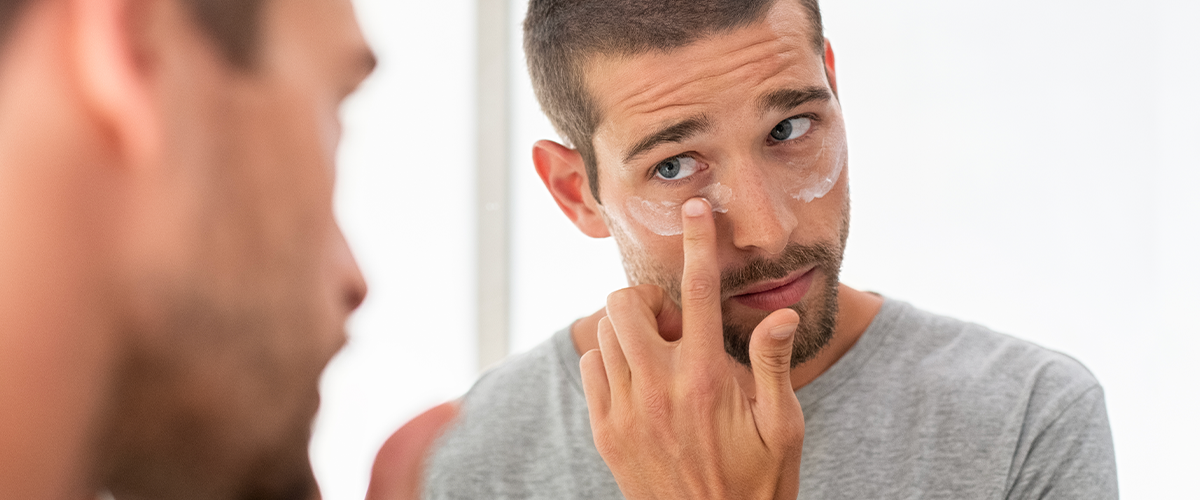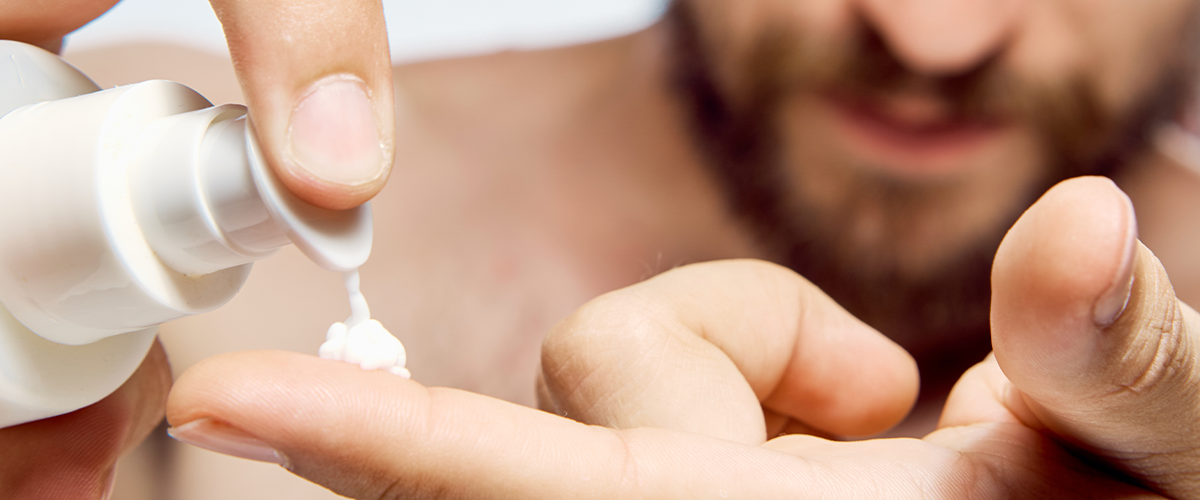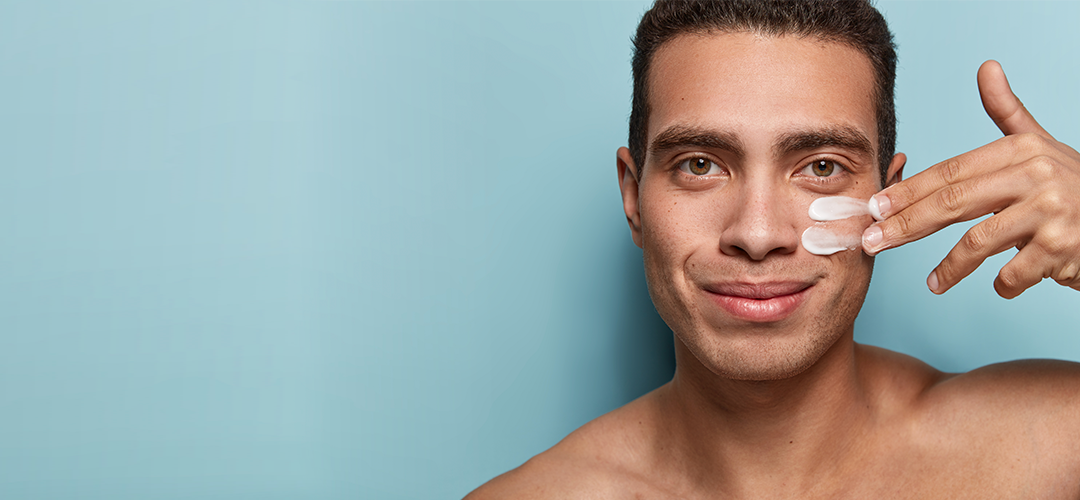From the way you style your hair to how you dress and speak, first impressions count. So, as the body’s largest and most visible organ, it’s important to look after your skin. A good men’s skincare regimen can help improve skin health and appearance. It can also mean the difference between showing up with confidence and not showing up at all.
You can shave years off your age with the right skin care treatments and products, so here are 8 key signs to suggest it may be time to start a new skincare routine.
1. Your skin has wrinkles
Wrinkles are a normal part of aging. They occur when the skin becomes thinner and less elastic over time and are most likely to form in areas that have been exposed to the sun’s UV rays, such as the face, neck, hands, and arms. Most blokes will start to see wrinkles develop in their late 30s to mid-40s.
Wrinkles tend to be more noticeable in men than women, as male skin is thicker and has more collagen. Further to this, testosterone levels decrease with age, which can lead to a loss of muscle mass and a decrease in skin elasticity.
To minimise the appearance of wrinkles and prevent new wrinkles from forming, there are a few skin-saving actions you can take. These include protecting the skin from the sun by wearing sunscreen and avoiding prolonged sun exposure, avoiding smoking (this can accelerate the aging process and make wrinkles more pronounced), following a healthy diet and lifestyle, and investing in a good skincare routine.

2. You have skin redness
Facial redness is a common problem for men, especially those with fair skin. Several factors can cause redness of the skin, including sun exposure, windburn, cold weather, and alcohol consumption. Facial redness can also be a symptom of a more severe skin condition called rosacea.
Rosacea is a chronic skin inflammation that can cause redness, swelling, and pimples. It usually affects the face; however, it can also affect the chest, neck, and back. Although rosacea is more common in women, it tends to be more severe in men.
Rosacea has no cure. Topical creams, oral antibiotics, and laser therapy can help manage the symptoms. Seeing a dermatologist for prescription skincare for rosacea may also be beneficial.
3. Your skin has a dull skin tone
Dull skin tone is a common skin issue for men, especially as they age. Several factors can contribute to dull skin, including sun damage, dehydration, and poor diet. Fortunately, if your skin has turned a little dull, you can do a few things to brighten your skin and give it a healthy glow.
Exfoliating regularly is a great way to remove dead skin cells and reveal fresh, radiant skin underneath. Using a brightening serum or prescription moisturiser can help to improve skin tone and deliver a more youthful appearance. And remember, healthy skin starts on the inside. So, drinking plenty of water can help to keep the skin hydrated, and eating a healthy diet with plenty of fruits, vegetables, and good fats can help to improve the appearance and texture of the skin.

4. Your skin has spots and pigmentation
Pigmentation is the colouring of the skin, and it can vary from person to person. For men, pigmentation is usually determined by the amount of melanin in the skin. Melanin is a pigment that gives skin its colour and is produced by cells called melanocytes. Men with more melanin in their skin typically have darker complexions, while men with less melanin will have lighter complexions.
Pigmentation can also be affected by other factors, such as sun exposure, hormones, aging, and certain medications. It can also signify an underlying medical condition, such as an autoimmune disorder. Some men don’t mind skin pigmentation; however, it can also be a source of insecurity for others. If concerned about skin pigmentation, speaking to a dermatologist will help to determine the cause and whether or not treatment is required.
5. Your skin has breakouts and acne
Acne occurs when the skin’s pores become blocked, trapping oil and bacteria inside. This can lead to blackheads, whiteheads, and pimples.
One of the most common causes of acne in men is hormone imbalances. Changes in hormones can trigger the overproduction of oil, leading to clogged pores and breakouts. Another common cause of acne in men is stress. When under stress, the body produces more hormones, which can again lead to an increase in oil production and breakouts.
Acne breakouts usually occur on the face; however, they can also appear on the chest, back (aka backne), and shoulders. Although acne is usually not considered a serious medical condition, it can cause emotional distress, low self-esteem, and permanent scarring if left untreated.
If you have acne-prone skin, there are many different treatments for acne, including over-the-counter acne medication, prescription medication, topical creams that can be applied to the skin’s surface, LED light therapy that stimulates collagen and elastin production while decreasing inflammation, and exfoliation for increased cell turnover.

6. Your skin is uncomfortably dry
For men, dry and dehydrated skin can be a real problem, especially during the winter months when skin changes hit an all-time high. Dry skin can cause itchiness, redness, flaking and general discomfort. In most cases, dry and tight skin is caused by a combination of factors, including harsh weather, drying skin care products, and a lack of hydration.
To combat dry skin, use a gentle cleanser, apply a rich moisturiser regularly – look for a moisturiser specifically designed for men’s skin, as they are typically oilier than women’s skincare products – and drink plenty of water. Using a humidifier in your home or office may also be helpful.
When looking for an appropriate skincare routine to tackle dryness and restore hydration, avoid retinoids, benzoyl peroxide, alcohol, salicylic acid, fragrances and preservatives, as these can trigger skin issues in men. To eliminate the guesswork, speak with a dermatologist or try personalised prescription skincare based on your skin concerns.
7. You have oily skin
Oily skin is a common skin type for men, and several factors can affect how much oil skin produces, including genetics, hormones, and diet. Environmental factors, such as cold weather, humidity and sun exposure, can also increase oiliness by compromising the skin’s barrier.
When the skin produces too much oil, it’s normal to notice extra shininess on the face, enlarged pores, or a higher likelihood of breakouts appearing. While attempting to dry out the skin may be tempting, this can worsen the problem. Instead, cleaning skin regularly and using products specifically designed to target excess oiliness is important. These products will help maintain good skin health by controlling oil production and keeping skin balanced.
8. You have sensitive skin
Potential causes of sensitive skin include environmental factors like pollution and weather, certain skincare products, and common irritants like harsh soaps, hot water and certain fabrics.
If you have sensitive skin, you may notice that your skin is often dry, red, or irritated. You may also find that certain products or ingredients cause your skin to react. If you have sensitive skin, it is important to use products designed for sensitive skin and avoid harsh chemicals or exfoliants, which can further irritate the skin.

The benefits of prescription skincare
Prescription skincare for men can offer a number of benefits for maintaining healthy and clear skin. Some of these benefits include:
- Customised treatment: Prescription skincare products are designed and prescribed based on a person’s individual skin type, concerns and goals. This personalised approach can be more effective than over-the-counter products that are made for the general population.
- Targeted results: Prescription skincare products contain higher concentrations of active ingredients, such as retinoids, glycolic acid, and niacinamide, which are more effective in treating specific skin concerns like acne, fine lines, wrinkles, and hyperpigmentation.
- Medical expertise: By working with a dermatologist or other skincare professional, you can receive expert advice and guidance on the best products and regimens for your skin type.
- Safe and effective: Prescription skincare products are thoroughly tested and regulated, ensuring that they are both safe and effective. A dermatologist can also monitor the effects of the products on your skin and adjust the prescription as needed.
- Prevention: Prescription skincare can help prevent future skin concerns, like sun damage and the signs of aging, by providing protection and promoting skin health.
It’s important to note that while prescription skincare can be effective, it’s still important to maintain a healthy lifestyle, including a balanced diet, exercise, and adequate sleep, for overall skin health.

Some ingredients used in prescription skincare products include:
Hyaluronic acid
Hyaluronic acid is a substance that is found naturally in the skin. It helps to keep the skin hydrated and plump by holding onto water molecules. In fact, hyaluronic acid can hold up to 1000 times its weight in water, making it an essential component of the skin’s hydration system.
In addition to its hydrating properties, hyaluronic acid helps to repair tissue damage and protect the skin from damage caused by environmental stressors like pollution and UV radiation. It is also thought to have anti-aging properties, as it can help to reduce the appearance of fine lines and wrinkles.
Retinoids
Retinoids are a compound derived from vitamin A commonly used to treat various skin conditions, including acne, wrinkles, and sun damage. Retinoids increase cell turnover, which helps improve the skin’s appearance. They also have antioxidant and anti-inflammatory properties, which can help protect the skin from damage. Prescription retinoids are more potent than over-the-counter products and are typically used to treat more severe skin conditions.
Niacinamide
Niacinamide is a form of vitamin B3 used topically to treat skin conditions, including acne, rosacea, and pigmentation. Niacinamide is believed to work by inhibiting the production of sebum – the oily substance that can clog pores and lead to breakouts.
Niacinamide is also thought to have anti-inflammatory properties, which can help reduce the redness and swelling associated with acne and even out skin tone by reducing the appearance of dark spots and hyperpigmentation.
Azelaic Acid
Azelaic acid is a naturally occurring compound with several benefits for the skin, including reducing inflammation, improving skin texture, and lightening hyperpigmentation. It is an antioxidant that helps protect the skin from damage caused by free radicals. It also has anti-inflammatory properties, which can help calm and soothe irritated skin.
Azelaic acid is effective in treating acne, as it helps to kill the bacteria that cause breakouts and gently exfoliates to keep pores clean. The acid is available in several forms, including creams, gels, and serums.
Antibiotics
Prescription antibiotics help to improve skin by reducing inflammation and fighting acne-causing bacteria. Antibiotics can be taken orally or applied directly to the skin. They are typically safe and effective when used for a short time until the acne clears up.
Get your skin health sorted!
